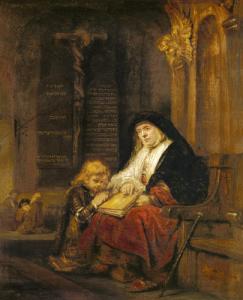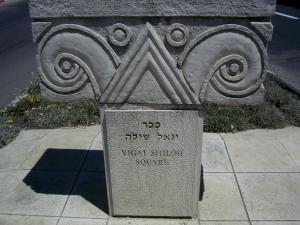 The lectionary prefigures the story of Jesus by giving us the origin tale of the prophet Samuel. Just as Samuel will “grow in favor and stature with God and human beings,” so it will be with Jesus, according to the Gospel of Luke (Luke 2:40). The settings of the two stories are both in temples with Jesus being given the further acclamation of many elders, and the astonishment of his parents, due to his precocious wisdom in the temple. In the earlier story Samuel is left in the temple of Shiloh by his mother Hannah, because she has vowed to make him a Nazirite, a set-aside priest, if YHWH grants her a son.
The lectionary prefigures the story of Jesus by giving us the origin tale of the prophet Samuel. Just as Samuel will “grow in favor and stature with God and human beings,” so it will be with Jesus, according to the Gospel of Luke (Luke 2:40). The settings of the two stories are both in temples with Jesus being given the further acclamation of many elders, and the astonishment of his parents, due to his precocious wisdom in the temple. In the earlier story Samuel is left in the temple of Shiloh by his mother Hannah, because she has vowed to make him a Nazirite, a set-aside priest, if YHWH grants her a son.
Of course, the stories soon diverge significantly. Jesus grows up an itinerant preacher with a small following of like-minded wanderers and is eventually murdered by the powerful of his day due to his outspoken attacks on the customs and religious ideas of those same powerful ones, not to mention the perceived threats to the Roman authorities he embodies. To the contrary, Samuel grows to become the most powerful religious and political figure in Israel, making and undoing kings and dying at a fantastic age with full honors and deep mourning. The endings of these two men could not be more different, yet this tiny notation in 1 Samuel concerning the young Samuel has long served commentators as some sort of preface to the emerging life of the young Jesus. I admit that the analogy stretches to the breaking point for me.
I tend to see the Samuel story in a rather different light, and if we can separate it from its loose connections to Jesus, it may serve us more helpfully as a relevant and worthy tale for our own time. The claim of this story, I think, has to do with the ongoing connection between Hannah and her son, a delightful and touching note in a tale that will all too soon become hard and painful for all.
It is important to remember what has preceded this part of the tale. Hannah has spent untold summers as a barren woman while her co-wife Peninnah has an expanding brood of children with their common husband, Elkanah. Hannah in abject desperation prays fervently in the Shiloh temple for a child, and despite the ridiculous high priest Eli’s absurd conviction that Hannah is drunk rather than at prayer, YHWH answers her, and she becomes pregnant. She names her son “Samuel,” a name based on Hebrew “to hear,” even though she claims that the name has something to do with “asking.” Ironically enough, the name “Saul” is based on that verb, not the verb “to ask.” In fact, the priest Eli makes the same mistake in our text today when he tells Hannah and Elkanah, “May YHWH give you seed from this woman due to the asking that she asked of YHWH” (1 Samuel 2:20—a very literal reading).
After Samuel is born, Elkanah asks Hannah to accompany him to the yearly sacrifice at Shiloh, a journey she has made many times and one no doubt expected of both of Elkanah’s wives. But now (1 Sam.1:22) she tells Elkanah forcefully that she will not go to Shiloh again until she has weaned her son. She refuses the trip for two reasons: she has no need of going because she now is a mother and would prefer to stay home with her boy and also she knows that when she next goes to Shiloh she will need to fulfill her vow to leave her son there as a Nazirite to YHWH. The title means “dedicated” and announces a religious vocation, one that could be for a few years or for a lifetime. In Samuel’s case the latter term seems to be the implication of Hannah’s vow. Hannah has become a woman to be reckoned with, no longer the sad and barren woman she has long been.
And though she does fulfill her vow and does leave her only son with the foolish Eli in dedication to YHWH, she refuses to forget him and refuses to cease caring for him. The boy Samuel is described as “wearing a linen ephod” (1 Sam.2:18). This is surely not the wildly elaborate priestly garment described in such rich detail in the book of Leviticus, but perhaps rather more like the rude and simple garment worn by king David as he whirls and dances before his people when the Ark of the Covenant is brought to the tent of meeting in Jerusalem far later in the story. Whatever this ephod was, it was apparently decidedly skimpy, because David’s estranged wife, Michal, accuses her husband of “uncovering himself before his servants’ maids…as any vulgar fellow might shamelessly uncover himself” (2 Sam.6:20). The king’s privates seem to be on full display, and the ephod he wears makes that possible. Hence, Samuel’s ephod is not a garment that serves its wearer as any sort of suitable covering, however religious in intent it may be.
By way of compensation perhaps, Hannah, year after year goes to Shiloh and gives her growing son a “little robe” that she has lovingly sewn, both as a sign of her devotion to him as well as a more useful covering on those cold nights in the small sanctuary. Exactly how long Hannah performs this delightful duty is unclear, but I imagine she goes to Shiloh with her ever lengthening robes as long as she is able.
Surely, then, when we are told that “Samuel continued to grow up healthy both with YHWH and with people” (1 Sam.2:26), he is enabled to do that in part with the aid of his mother’s unbreakable devotion. Exactly what these two words mean used to describe the growing Samuel is not simple to pinpoint. The first is read by NRSV as “stature,” certainly not wrong since the word basically has to do with size; big as opposed to small, though the word “stature” in English often contains an element of worthiness or extraordinary significance. The second word the NRSV reads as “favor,” though it is merely the common word for “good.” However, any reading like “greatness and goodness” or “stature and favor” may suggest more than the words actually imply. They could simply mean the healthy growth of a boy turning into a man; if so, then a translation like “a fine figure of a man” might serve the purpose. Samuel is described as tall and healthy, no more, and any suggestion about his morality or his goodness is not discussed here. I tend to think that may be the case, since later in Samuel’s life his morality and his supposed strict devotion to his God will be called into serious question as he makes and then breaks the first king of Israel, Saul.
I love this little story in the lengthy tale of Samuel, Saul, and David. As usual in these writings more is happening than meets the eye of those who read too quickly. The boy Samuel will become the mighty prophet, maker and breaker of kings. But the wonderful devotion of his mother Hannah should never be forgotten. The fabulous figure of Jesus’ mother Mary, made so significant in the ensuing centuries of Christianity, has a worthy forebear in Hannah, whose devotion to her son is equivalent to that ascribed to Mary a millennium later.











